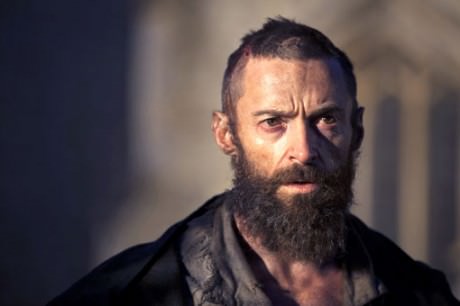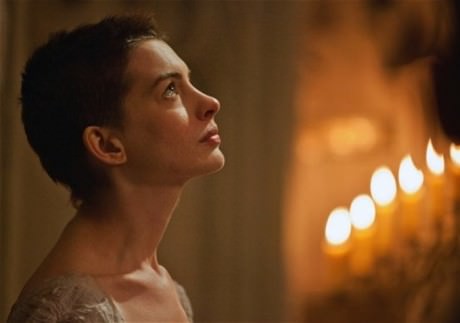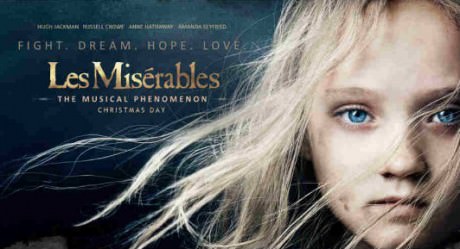Watching yet another of my theater friends join the barricades over the filmed version of Les Misérables, I decided it was time for a fresh viewing. Was it really a failed take on the international stage hit — and was I dead wrong to call it the best movie of 2012?

The charges against the film are many, and one apparently need not have seen the movie at all to endorse a few: The director, Tom Hooper (Oscar winner for The King’s Speech), over-reached in casting actors who could not measure up vocally to the heavyweights of London and Broadway. Worse, it was folly to have them do their own singing live on set rather than lip-sync to studio dubs. On a design level, the look of the sets and costumes careens around as wildly as a Mack Sennett hook-and-ladder on a fire drill. There is too much jarring editing, the pace is too slow, and there are way too many tight close-ups on large emotions. Or, as one viewer observed pithily, “it was too dramatic.”
Upon a second viewing, I submit that while some of this is true, none of it matters. In part what we’re hearing are the sorts of prejudices that plague all new adaptations: ie, the movie isn’t as good as the book; the new star can’t hold a candle to the original; the CD is only a thin approximation of the LP, etc. There may be a deeper explanation, though, that I will come to in a minute.
The pop culture annals are logjammed with examples of true stage-to-screen fizzles, most of them forgotten. Want a recent example of how that special show-time mega-magic can be bleached out by a movie director? Queue up A Chorus Line or go back and rent Rent. No one accused these films of being “too dramatic,” mainly because they were by and large bogus.
Les Miz has always been about big emotions — human degradation, dying mothers, abused orphans, self-righteous policemen, idealistic martyrs, damnation and Christian redemption. The only way a movie director could tone down such material is to short-change it, or distance us from its tragic figures through veils of artifice, the way the new Anna Karenina does.
I admit to being bothered at first by Hooper’s opening of Les Miz with a gigantic CGI “spectacle” designed to show the bedraggled human prisoners in relation to the universe. That chain gang of human ants in a typhoon — tugging a ship into dock like Sisyphus with his boulder — looks a bit comic-booky to me, or like a bloated Superbowl ad. But that is the state of today’s cinema, and it is a fitting visual accompaniment for Claude-Michel Schonberg’s dramatic orchestral chords.
On second viewing, it makes for a pretty dynamic movie opening, nearly the equivalent to the lifting of a Broadway curtain. “Look down, look down” the wary prisoners chant, expressing their hopelessness, but also inviting us to view them with the same lofty omniscience that Victor Hugo adopted in his novel.
Soon enough, Hooper focuses in on the faces of the two central players in the melodrama: Hugh Jackman and Russell Crowe, playing the forlorn convict, Jean Valjean, and his life-long persecutor, Inspector Javert.
Hooper does not attempt to redefine or limit the songs for the movie-goer, which means that some of the lyrical exposition that was necessary on stage is less so on screen. But I was thrilled to see every major aria honored, re-interpreted and delivered expressly for his camera. Score one for intimacy.
With the close-up lens and the megaphone of music, the emotions are definitely all front and center. (Anne Hathaway’s anguished solo may eventually play better on DVD at home, where the intimacy is scaled to living room consumption). The wide-ranging story is also more clearly sorted out on screen, as are the characters and their relationships.
I saw the play’s pre-Broadway debut at The Kennedy Center in 1987 and have seen a half-dozen productions since; yet I never saw the Thenadiers as anything but comic relief, nor did I grasp the evolving relationship between Cosette and Eponine. Those are just two of the novel’s many strands fleshed out for me by the film.

I had to see the musical more than once before I surrendered to its lush, operatic melodies, decades-hopping action and larger-than-life emotionalism. So I expect it will take some time for general audiences to warm to all that Hooper and cast have packed into their movie.
On my second viewing, I was again impressed to find modern filmmakers trying to do justice to such a story. This is, after all, a story about something more than love, betrayal, revenge and “empowerment” — the only themes that Hollywood deems worthy of much interest any more.
Hugo’s novel has a bigger target, namely the problem of humanity’s narcissistic obsessions and the constant battle between love and hatred for dominance in the human heart. Those are themes more critical now than ever before, with today’s instant-messaging networks and weapons of mass destruction.
Which brings me to my final point: Like Tolstoy and Dostoyevsky, Victor Hugo did not shy away from questions of a power larger than ourselves, nor did he avoid questions of virtue and moral order, consequences and judgments — all the stuff that our secular world tells us is relative, or beneath our concern.
The story unapologetically brushes aside moral equivocation in its search for absolutes. That could be a major reason why many are quick to dish Les Miz as it vies for Hollywood’s brass ring.
Hugo wrote society a prescription for Les Misérables, a path toward individual salvation requiring sacrifice and transformation. And hasn’t that always made people a bit uncomfortable at the movies?
LINK
Les Misérables the film’s website.
https://youtu.be/EN9OuGe5AV4
https://youtu.be/vzIQcFUkGEg






I have only seen Les Mis twice: the original Kennedy Center production and the PBS anniversary concert in London which they air during fund raising week. We don’t go to musical theater for reality but for great drama, great acting, and great music. Unless you are really nit-picking, I can’t see how you could mess up with this formula. Signature did a nice job recently.
In fantasy, I would like to direct a high school production without the rotating stage and battle elements, but focusing on the story and music.